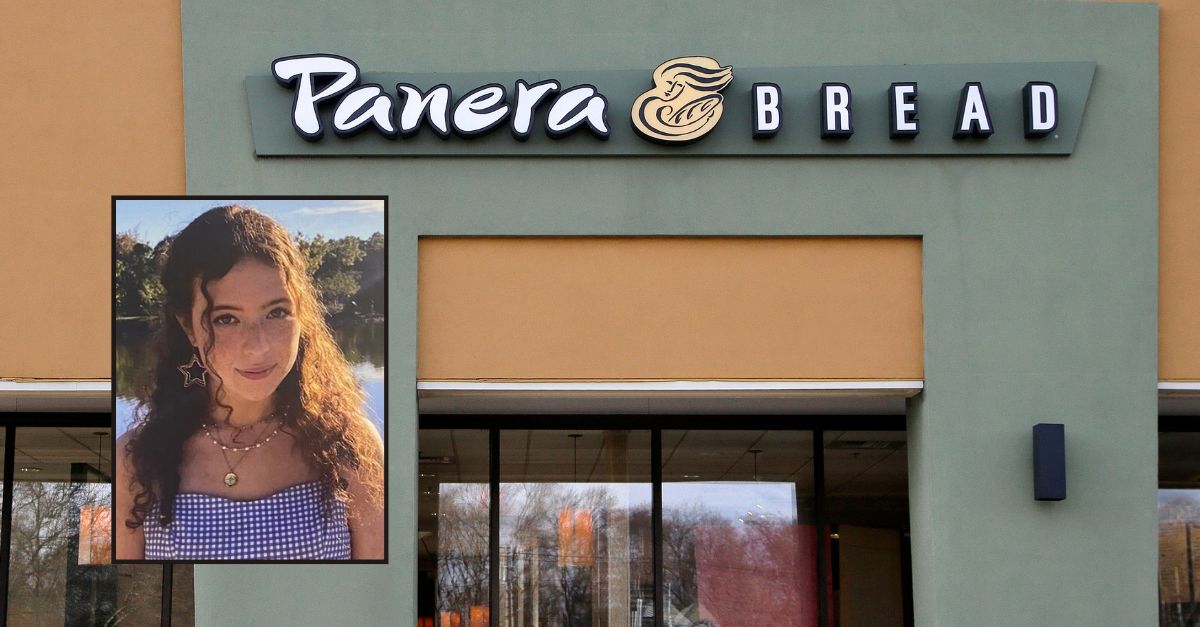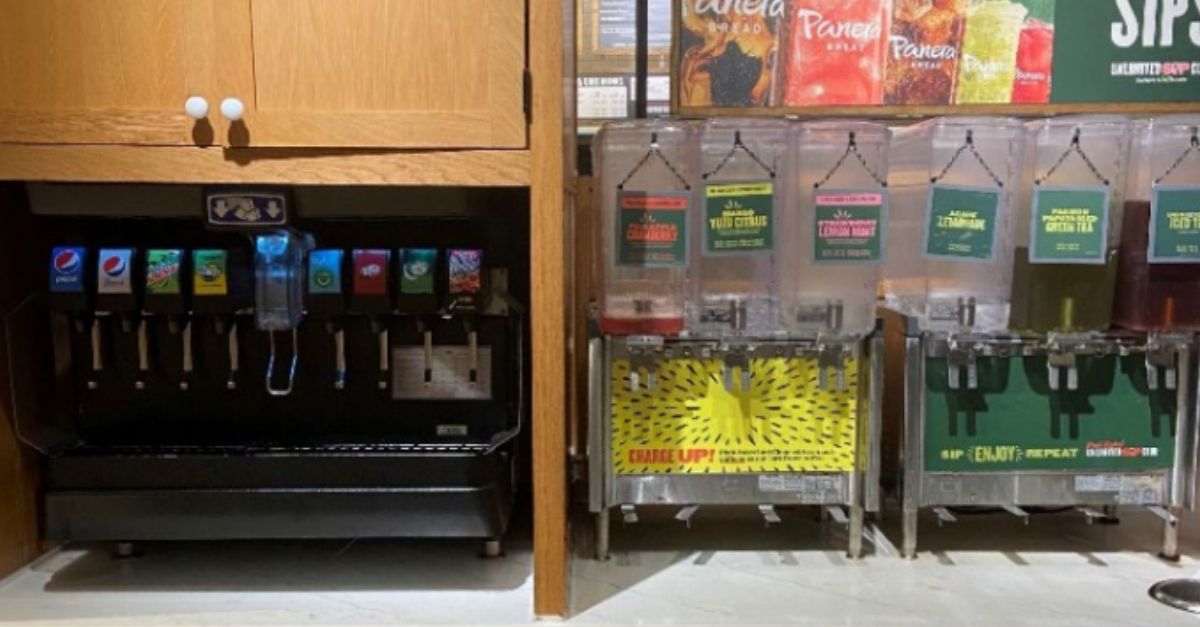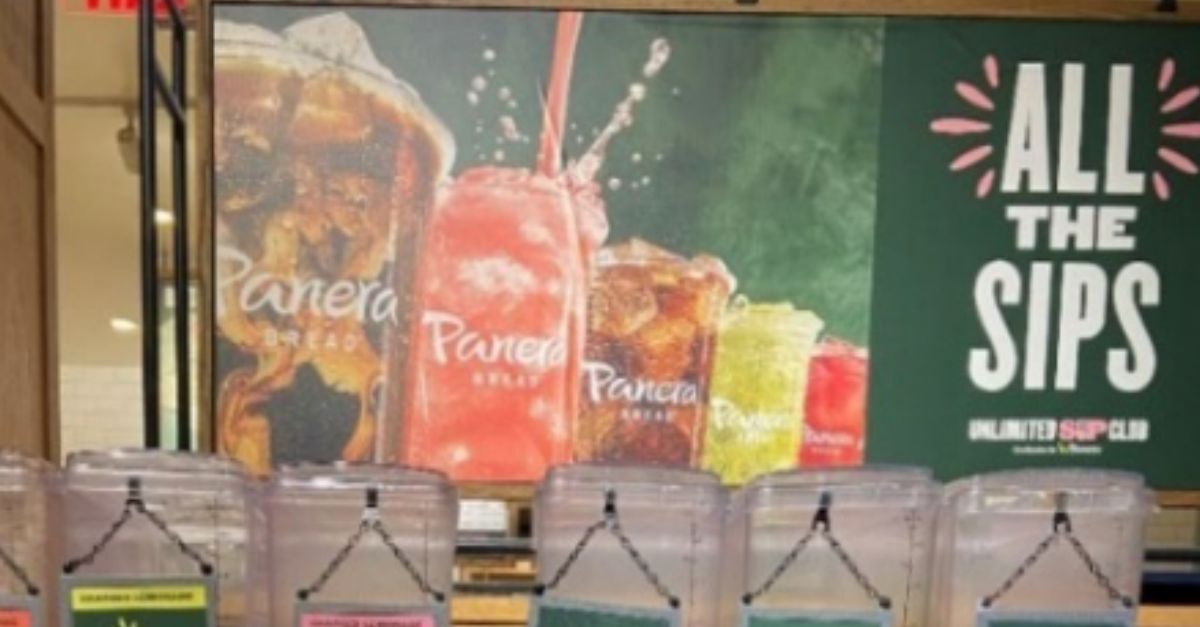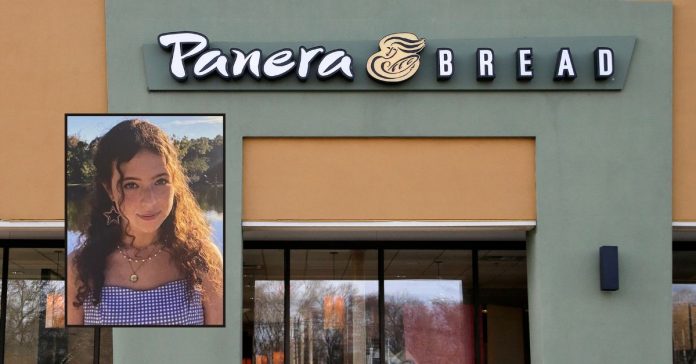
The entrance to a Panera Bread restaurant location is shown (AP Photo/Steven Senne). Inset: Sarah Katz (photo provided by family).
The parents of a 21-year-old student at the University of Pennsylvania sued Panera Bread Monday, claiming that the cafe’s “Charged Lemonade” was responsible for their daughter’s sudden and tragic death.
Jill and Michael Katz filed a 26-page complaint against Panera in the Philadelphia Court of Common Pleas in which they allege that the “unreasonably dangerous” drink contained excessive amounts of sugar and caffeine and lacked proper warning labels that would have prevented their daughter Sarah Katz from ingesting it.
The family detailed some of Sarah’s accomplished background, including that Sarah received a full merit scholarship to learn Mandarin at the University of Electronic Science and Technology of China before heading to Penn. In addition to studying international relations and health and societies at the Ivy League college, Sarah also worked as a as a research assistant at the Children’s Hospital of Philadelphia and worked with the American Heart Association where she taught CPR in high schools and underserved communities.
Sarah also led a CPR training project on campus, was a member of the John Marshall Pre-Law Honor Society, a member in Penn Hillel, and the social chair of Sigma Kappa sorority.
Sarah’s parents say she was diagnosed with Long QT Type 1 Syndrome (LQT1) at age five; the condition can cause life-threatening arrhythmias that disrupt the heart’s normal electrical activity, particularly after intense exercise. LQT1 is said to be typically manageable and responsible to medication in most cases.
The Katzes said their daughter regularly saw a doctor about her condition and followed all medical advice related to her condition which included abstaining from energy drinks and highly caffeinated beverages. However, they said Sarah did drink electrolyte drinks, such as Gatorade, and was medically permitted to have “reasonable amounts of caffeine.”
They said Sarah was aware of the Panera brand, and knew it to be “a healthier and ‘clean’ fast food chain restaurant for adults and children alike.”
However, one Panera location in Center City, Philadelphia offered its “Charged Lemonade” alongside other non-caffeinated and/or less caffeinated drinks and did not specifically list it as an “energy drink” or otherwise warn of potential side effects.
A photo of the Panera beverage fountain can be seen below with sodas on the far left surrounded by wooden cabinetry, “Charged” drinks in the center with yellow signage, and other lemonades and iced teas at the far right with green signage. The plaintiffs note that the Gatorade logo uses a heavy black capital letter “G,” along with a lightening bolt, which “represents the energy and power the drink gives through electrolytes, such as potassium and sodium,” and that Gatorade does not contain caffeine.

Panera “Charged Lemonade” dispenser shown alongside other fountain beverages. (image via court documents).
Further, the complaint said, the beverage is listen on Panera’s menu next to dark roast coffee, without any mention of the lemonade’s containing guarana (a plant extract that contains caffeine and other stimulants) or “exorbitant amounts of sugar.” Rather, it said, “Panera Charged Lemonade is advertised as ‘Plant-based and Clean with as much caffeine as our Dark Roast coffee’ in small print and suggests ‘Sip, ENJOY, Repeat. Unlimited Sip Club.””
However, said the complaint, a large size Charged Lemonade contains 390 milligrams of caffeine— more than the combined caffeine content of 12 fluid ounces of Red Bull and 16 fluid ounces of Monster Energy Drink, and more than a large dark roast coffee.
Court filings also included a photo of the signage above the Charged Lemonade fountain which promotes Panera’s “Unlimited Sip Club.” Sarah was a member of the Unlimited Sip Club, which allowed her to partake in complimentary refills of certain beverages, including the Charged Lemonade.

Signage atop Panera’s fountain beverages is shown. (image via court documents).
In addition to caffeine levels, the complaint also took issue with the sugar content of Panera’s product: 124 grams in a large, which “exceed[s] the combined contents of both a 12-fluid-ounce Red Bull (27 grams of sugar) and 16-fluid-ounce Monster Energy Drink (54 grams of sugar)” and ” is equivalent to…29.75 teaspoons of sugar.”
The complaint alleged that Sarah, believing it was safe for her to do so, consumed Charged Lemonade on Sept. 10, 2022. Later the same day, she suffered cardiac arrest while with friends at a restaurant in her apartment building. Sarah was taken to a nearby hospital where she had another cardiac arrest and then died.
The Katz family brought claims for defective warning, defective manufacturing, strict products liability, negligence, misrepresentation, breach of warranty, and wrongful death against Panera.
Katz family attorney Elizabeth Crawford told Law&Crime in a call Monday that the motivation behind the lawsuit was to protect others.
“Panera had a duty to warn people that this was an energy drink, and it failed,” Crawford said.
“One of Sarah’s favorite quotes was, ‘When you save one life, you save the world,’” recalled the attorney. “This product is a hidden danger not only to people with known heart conditions, but also to those with caffeine sensitivities, people who have underlying health conditions, people who are pregnant, and many others.”
Panera did not respond to request for comment.
You can read the full lawsuit here.
Have a tip we should know? [email protected]

